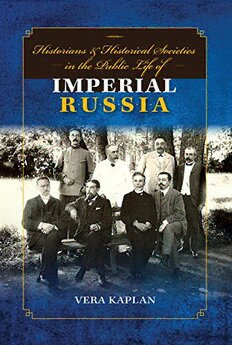
Historians and Historical Societies in the Public Life of Imperial Russia PDF
Preview Historians and Historical Societies in the Public Life of Imperial Russia
HISTORIANS and HISTORICAL SOCIETIES in the PUBLIC LIFE of IMPERIAL RUSSIA This page intentionally left blank HISTOR IANS and HISTOR ICAL SOCIETIES in the PUBLIC LIFE of IMPER IAL RUSSIA Vera Kaplan Indiana University Press Bloomington and Indianapolis This book is a publication of Indiana University Press Office of Scholarly Publishing Herman B Wells Library 350 1320 East 10th Street Bloomington, Indiana 47405 USA iupress.indiana.edu © 2017 by Vera Kaplan All rights reserved No part of this book may be reproduced or utilized in any form or by any means, electronic or mechanical, including photocopying and recording, or by any information storage and retrieval system, without permission in writing from the publisher. The Association of American University Presses’ Resolution on Permissions constitutes the only exception to this prohibition. ∞ The paper used in this publication meets the minimum requirements of the American National Standard for Information Sciences—Permanence of Paper for Printed Library Materials, ANSI Z39.48–1992. Manufactured in the United States of America Cataloging information is available from the Library of Congress. ISBN 978-0-253-02398-8 (cloth) ISBN 978-0-253-02406-0 (ebook) 1 2 3 4 5 22 21 20 19 18 17 For my father, and in fond memory of my mother This page intentionally left blank Contents Acknowledgments ix Note on Transliteration xi List of Abbreviations xiii Introduction 1 1 From Associations of the Educated to Societies for Education: Historical Background 23 2 Historical Societies at the Juncture of Scholarship, Politics, and Education 80 3 From the University Societies to the “University Extension”: Historians as Public Activists 154 4 The Society of Zealots of Russian Historical Education: Conservative Activism and the Quest for Useful History 182 Conclusion: Voluntary Historical Societies in the Fin-de-Siècle Associational World 262 Bibliography 277 Index 313 This page intentionally left blank Acknowledgments I t is a distinct pleasure to begin this book with words of thanks to all those peo- ple and institutions who have advised, assisted, and supported me in the course of the research for this book, and during its writing. My research was supported by the Israel Science Foundation (grant no. 134/09). Its generous funding enabled me to undertake extensive archival research, which constitutes the most fascinating part of the historian’s labor. Yet, anyone who has ever visited the Russian archives knows how complicated their structure and methods of operation are. However, my work there was made pleasant and effective thanks to the assistance of my colleague from the Cummings Center of Russian and East European Studies at Tel Aviv University, Boris Morozov. As a renowned expert on Russian archives, he helped me to collect documents from the Moscow archives. Furthermore, I would never have been able to discover and explore the treasures of St. Petersburg’s archives without the invaluable aid and advice of Viktor Efimovich Kelner, who shared with me his extraordinary erudi- tion and experience. I am also deeply grateful to the staff of the Russian state and municipal archives, whose names usually remain unknown, but whose every- day efforts to fulfill researchers’ requests deserve much greater appreciation. I am especially grateful to the personnel of the Department of Manuscripts of the Russian National Library, who were so kind and helpful. Special thanks are due to this Department and its head, Aleksei Ivanovich Alekseev, for permission to reproduce some photographs from its rich collection of visual sources. I was privileged to be able to discuss the idea for this book with the late Michael Confino, from whom so many of us learned so much. My colleagues and, in various ways, academic mentors, Gabriel Gorodetsky and Avner Ben- Amos, read the first version of a project proposal in which the plan for the study was outlined; their thoughtful criticism helped me to turn my vague aspirations into a “flesh and blood” research program. The study has also benefited a great deal from my conversations and correspondence with Boris Kolonitsky, Pavel Tribunskii, Vitalii Tikhonov, Wladimir Bérélowitch, Frances Nethercott, Larry Holmes, and Ben Eklof. The members of Tel Aviv University’s Department of History were very attentive and encouraging when I presented them the inter- mediary results of the research; their questions and suggestions made a valuable contribution to its further progress. Mark Gamsa, Igal Halfin, Yaacov Ro’i, and Oded Rabinovitch read various portions of the manuscript; their critical com- ments were constructive and extremely beneficial for me. Iris Rachamimov, Dina Moyal, Inna Shtakser, and Deena Leventer, with whom I have worked closely in ix
